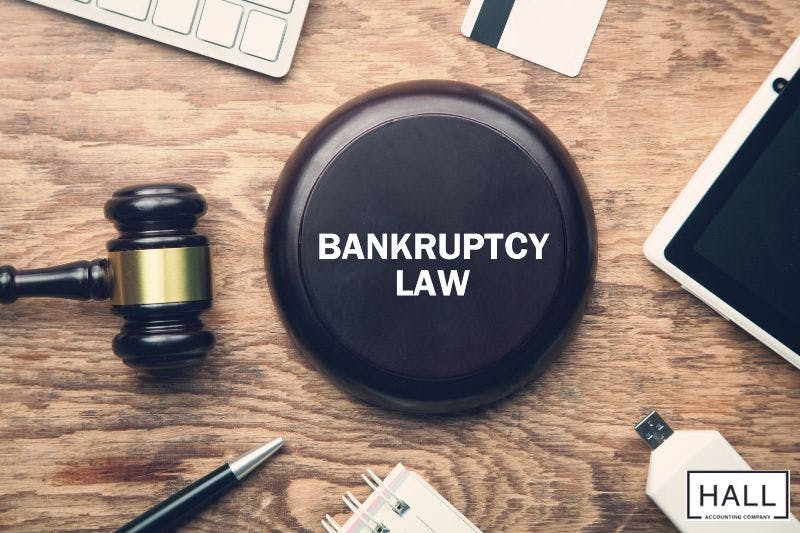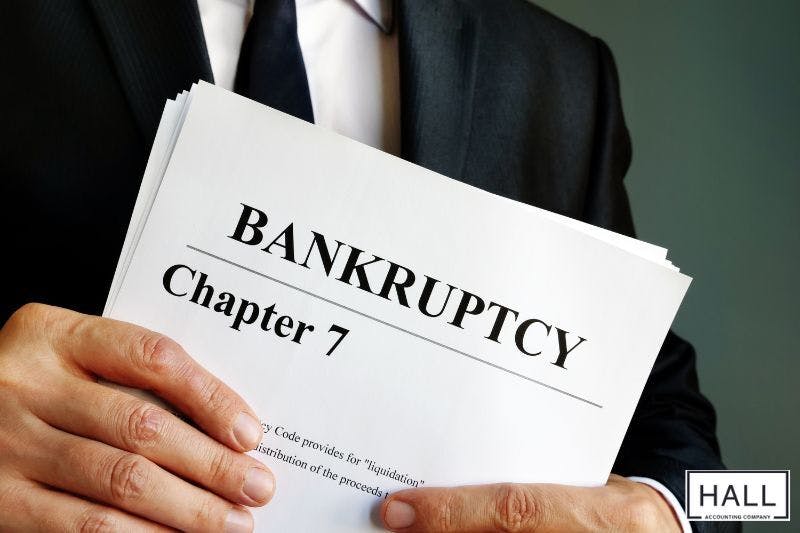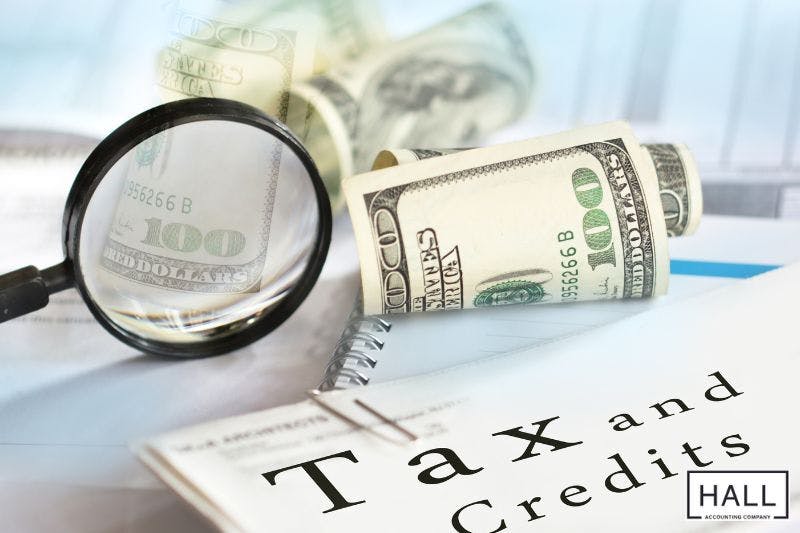
Keeping your tax refund when you’re thinking about filing for Chapter 7 bankruptcy, or after you have filed, is based on several factors, including asset exemptions and the timing of the bankruptcy filing. Tax refunds are considered an asset, and will need to be declared to the court-appointed bankruptcy trustee, in every case.
In this article, we’ll discuss a number of issues that are relevant to the topic of tax refunds when filing for Chapter 7 bankruptcy. These will include federal and state laws governing a bankruptcy estate, exemptions for certain assets, the timing of the bankruptcy filing, and who you can turn to for help during this process.
If you haven’t yet begun filing for bankruptcy, but are seriously considering it, we’re going to ask you to pause for a moment and just take a deep breath. This is a tough decision, and no one wants to file for bankruptcy.
Most people want to meet their financial obligations, but going into panic mode about protecting your assets, and making rash decisions won’t help you get through this process any better. There are ways to protect assets (including your tax refund) but you will need to make peace with the fact that you’re going to have to declare ALL your assets.
So, let’s stay on track and help you understand what happens to your tax refund during chapter 7 bankruptcy; And why everything has to be done by the book with the help of a bankruptcy attorney, or a CPA in some cases.
Laws that define Chapter 7 assets

Both federal and state laws provide the definition of an asset when you file bankruptcy. The U.S. Bankruptcy Code is one, and another is the Internal Revenue Code.
U.S. Bankruptcy Code (Title 11 of the United States Code)
Three sections under this code provide guidance for what constitutes “property of the estate”, and exemptions that protect certain assets (we will cover these later).
Section 541: Defines what constitutes the “property of the estate.” In a Chapter 7 bankruptcy, the debtor's estate includes all legal or equitable interests the debtor has in property at the time of the bankruptcy filing. This definition generally includes tax refunds that are owed to the debtor for a tax year before the filing date.
Section 522: Outlines federal exemptions that a debtor can use to protect certain assets from being included in the bankruptcy estate. Some states have their own exemption laws that may be used in place of or in addition to federal exemptions.
Section 726: Addresses the distribution of property of the estate, including bankruptcy estate tax refunds, to creditors in the order of priority established by law.
Internal Revenue Code (Title 26 of the United States Code)
The IRS has specific rules for handling tax refunds for individuals filing bankruptcy. The IRS treats any refund as an asset of the bankruptcy estate if it pertains to a tax year before the filing of the bankruptcy.
These laws pretty much cover everything that is related to tax refunds, and how the bankruptcy court will view your assets. Based on these laws, we can begin discussing your options.
Timing of the bankruptcy process

Bankruptcy is a tedious process that requires a large amount of paperwork to be collected and the filing to be prepared by a bankruptcy lawyer. As Attorney John Skiba explains on his YouTube channel, the entire process can take between 4–6 months to complete, however, as soon as filing takes place, all collections against you stop.
This means your creditors can no longer ask you for payments, and this is done by a court order, called an automatic stay.
This is great news when creditors and debt collectors have been hounding you for money you don’t have, but this also means that all disposable income is now included in the bankruptcy case, (including your tax refund).
About a month after the filing, a 341 meeting will take place between concerned parties, according to the requirements of the Bankruptcy Code. The court-appointed trustee will check the status of your tax refund, especially if they have been notified of a large refund due by the IRS.
There are a number of actions you can take to protect your tax refund, and you need to carefully consider these options before, during, and after you file for bankruptcy. Attorney Doug Powell, a Texas Legal Network lawyer, provides a comprehensive YouTube video for bankruptcy filers, but we’ll summarize the options for you below.
Before you file, get your tax returns up-to-date
Bankruptcy laws require your income tax filings to be up-to-date by the time you file for Chapter 7 bankruptcy. If you’ve gotten behind on filing taxes, you will need to address this first. In this case, you can work with a CPA firm, such as Hall Accounting Company, who can help you complete your tax returns, and help you take steps to protect your tax refund.
Need help? We are just a phone call away. Our senior tax associates will meet with you to discuss your income tax needs, file late returns, and deal with the IRS on your behalf.
Filing before you receive a refund
Filing at the start of the tax season (Jan-Apr) and being some way into the process by the time you receive your refund definitely includes it as “property of the estate”. You will need to declare the tax refund to the trustee.
If it's a small amount e.g., less than $1,500 the trustee may decide not to include it in the estate, and you will be free to spend it. However, anything over this amount will be included, and distributed to your creditors.
Filing after you receive a refund
This can be a tricky one because it’s not clear-cut. Most people know for 6–12 months that they might file for bankruptcy. During this time, the court looks at intent with regard to your assets.
Whether you tried to hide assets before filing (including spending your tax refund), will be considered, and if you are found guilty of misconduct, your entire bankruptcy case can be disallowed.
But there are legitimate ways for you to spend your refund money. Again, discuss them with your bankruptcy attorney, but here are some legally acceptable ways to keep your tax refund in Chapter 7 filings.
Further reading: Will I Get a Tax Refund if My Business Loses Money?
Pay secured debts

Catch up on bills that you haven’t been able to pay, but only for secured debts such as mortgage payments, vehicle payments, and rent. Unsecured debts such as credit cards, student loans, and family loans do not count. Now, we need to discuss using your tax refund to repay loans to family members.
They are considered by bankruptcy law to be a creditor. Once you begin the process, how you pay creditors becomes the business of the trustee, who works out a payment plan for each creditor. It may seem like a good idea to pay back Grandma (and it is), but paying Grandma and then filing for bankruptcy may cause the trustee to ask for the money to be returned.
Pay deferred medical expenses
Usually, bankruptcy filers are behind on paying for things they really need such as a visit to the doctor for chronic illnesses, dentist visits to fix a broken tooth, and medical tests. You can use your tax refund to pay for these urgent expenses. However, you cannot pay for non-urgent procedures such as cosmetic surgery.
Repairs to your home or vehicle
The catchphrase that’s applicable here is: reasonable and necessary expenses. This is a great guide for you to understand what is allowed and what’s not.
For your home, repairs such as a leaking roof, broken toilet or water pipers, and other issues that cause damage or safety concerns are acceptable. For your vehicle, engine repairs, tires, or windscreen repairs are allowed.
Living expenses
If you’ve been unemployed for a number of months and are now forced to file for Chapter 7 bankruptcy, you can make a case for using your tax refund for day-to-day living expenses. You must be able to show that you were not employed, and had no other source of income to take care of these expenses.
Asset exemptions that protect your tax refund

There are also a number of exemptions that can help to protect your tax refund, but this depends on federal and state laws. Here are three common exemptions.
Wildcard Exemption: The federal wildcard exemption allows debtors to protect any assets, including cash or tax refunds, up to a certain dollar amount.
Earned Income Tax Credit (EITC) Exemption: Under federal law, the portion of your tax refund attributable to the Earned Income Tax Credit is exempt from bankruptcy.
Child Tax Credit (CTC) Exemption: Similar to the EITC, any portion of your tax refund related to the Child Tax Credit may be exempt.
Get help with your Chapter 7 bankruptcy case
At the beginning of this article, we acknowledged how tough a bankruptcy claim can be on people. This is a worrying and stressful life event that has far-reaching repercussions. We recommend that you don’t try to go through this process alone. There are traps you can fall into because you do not understand the legalities, and there are also benefits you may miss out on for the same reason.
There are two parties you should consider involving in your case as a matter of urgency. If you have overdue tax debt before filing, you can contact a CPA firm.
They can help you to understand the financial implications, tax laws, and help you complete your tax return. For example, if you know you’re going to file a Chapter 7 bankruptcy, they can advise how you can adjust your tax withholding to reduce your refund to a small amount.
You should also try to hire a bankruptcy lawyer. In some cases, you may be able to use your tax refund to pay for lawyer fees. A lawyer will help you collect all the documentation for a Chapter 7 filing, and submit the filing to the court.
They will also tell you when the best timing is for you to begin the process. If you have hired a CPA firm already, they can work alongside your lawyer to handle the financial aspects of your case.
We hope this article has given you some idea of the direction you need to go in. Hall Accounting Company is happy to assist you with tax-related matters whenever you need expert advice from highly skilled professionals.